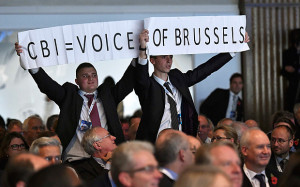 For most people observing – including myself – the existence of two major groupings on the Leave side of the referendum wasn’t really an issue. Arron Banks’ Leave.EU hasn’t looked nearly as serious a proposition as Vote Leave, either in terms of ideological breadth or of general respectability (however you’d like to define that). Vote Leave has been sober, serious and generally had the feel of an official campaigning group. A bit dull, but worthy of communicating that side of the discussion.
For most people observing – including myself – the existence of two major groupings on the Leave side of the referendum wasn’t really an issue. Arron Banks’ Leave.EU hasn’t looked nearly as serious a proposition as Vote Leave, either in terms of ideological breadth or of general respectability (however you’d like to define that). Vote Leave has been sober, serious and generally had the feel of an official campaigning group. A bit dull, but worthy of communicating that side of the discussion.
Obviously, someone’s had a meeting at some point in recent weeks and decided that being a bit dull wasn’t the right play.
Hence, Students for Britain’s heckling at David Cameron’s CBI speech earlier this week. The stunt got some coverage, but was actually more noteworthy for Vote Leave’s support in the organising it: as Robert Oxley, Vote Leave’s media head, said:
“We will be working together closely during the campaign to do more of these protests – particularly at the AGMs of big companies who try to scare the British people into voting to remain”
This is not unreasonable as a strategy, and certainly the CBI looks rather less able to push a strong pro-EU line after this week’s events, so the logic is not that tenuous.
However, it has had the unexpected side-effect of moving Eric Pickles to complain to the Electoral Commission that Vote Leave’s stated intention to campaign ‘nasty’ should disbar them from becoming the official group. Pickles is broadly sympathetic to Cameron’s approach, enough that Vote Leave chose to portray the complaint as a sign that Cameron’s team was rattled and trying to deflect attention from the general indifference to his letter to Donald Tusk, which spelled out the broad areas for negotiation.
Obviously, in all of this, there’s a lot of spinning going on, but a number of things look pretty clear.
The first is that Vote Leave are very confident about becoming the official grouping. In practice, the CBI heckle wasn’t the most intrusive of actions and one that can’t easily be replicated at AGMs, so the intention to ‘do more of these’ remains just that, an intention. Students for Britain might find that until the Electoral Commission makes its decision, there will be more planning than action.
The second is that Leave.EU continues to suffer from a comparative lack of media and popular interest. Recall that bad publicity is better than no publicity at all (VW might disagree on this one), especially if it allows Vote Leave to communicate the impression that Cameron is actually concerned enough to try using a third party to halt them.
The third is that the Leave side will always enjoy benefits from its position as the change option. As much as the status quo carries great weight, being the challenger allows for such opportunistic approaches that speak to images of pluck and verve. The Remain campaign will never have a similar opportunity to the CBI heckling, precisely because none of the major meetings of economic or social actors have taken a sceptical stance to EU membership.However, ‘meeting agrees something’ isn’t nearly as good a headline as ‘hecklers disrupt meeting’.
All of this comes with a warning, however. While it is good to mix things up, Vote Leave will have to balance that with the risk that others paint them as being less than serious. The heckling might has raised the profile of those involved and the issues around the CBI’s stance, but that’s still a considerable distance from changing peoples’ minds about how to vote. And neither side have cracked that one yet.
